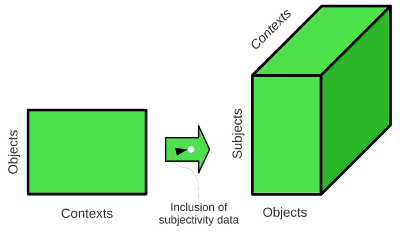
GICA - Grounded Intersubjective Concept Analysis
GICA - a new method
We have recently introduced a novel method to analyze and make visible differences among people regarding how they conceptualize the world. The Grounded Intersubjective Concept Analysis (GICA) method first employs either a conceptual survey or a text mining step to elicit particular ways in which terms and associated concepts are used among individuals. The subsequent analysis and visualization reveals potential underlying groupings of people, objects and contexts.
The GICA method extends the basic idea of the traditional term-document matrix analysis to include a third dimension of different individuals. This leads to a formation of a third-order tensor of Subjects x Objects x Contexts. Through flattening, these Subject-Object-Context (SOC) tensors can be analyzed using various computational methods.

Background
In human communication, it is the occasional clear failure that allows us to see that understanding language is often difficult. In making the connection between a word and its typical and appropriate use, we humans rely on a long learning process. The process is made possible and guided by our genetic make-up, but its success essentially requires extensive immersion to a culture and contexts of using words and expressions. To the extent that these contexts are shared among individual language speakers, we are then able to understand each other.
When our learning contexts differ, however, differences in understanding the concepts themselves arise and subsequent communication failures begin to take place. Two main failure types can be detected. The first type is false agreement, where on the surface it looks as if we agree, but in fact our conceptual difference hides the underlying difference in opinions or world views. The second type of problem caused by undiscovered meaning differences is false disagreement. If we are raised (linguistically speaking) in different sub-cultures, we might come to share ideas and views, but might have learned to use different expressions to describe them.
Presentations
Publications
- Timo Honkela, Juha Raitio, Krista Lagus, Ilari T. Nieminen, Nina Honkela, and Mika Pantzar. Subjects on objects in contexts: Using GICA method to quantify epistemological subjectivity. In Proceedings of IJCNN 2012, International Joint Conference on Neural Networks, pages 2875-2883.
- Timo Honkela, Nina Janasik, Krista Lagus, Tiina Lindh-Knuutila, Mika Pantzar, and Juha Raitio. GICA: Grounded intersubjective concept analysis - a method for enhancing mutual understanding and participation. Technical Report TKK-ICS-R41, AALTO-ICS, ESPOO, December 2010.
Earlier related work
- Timo Honkela. Neural nets that discuss: a general model of communication based on self-organizing maps. In S. Gielen and B. Kappen, editors, Proceedings of ICANN'93, International Conference on Artificial Neural Networks, pages 408-411, Amsterdam, the Netherlands, September 1993. Springer-Verlag, London.
- Timo Honkela. Self-Organizing Maps in Natural Language Processing. PhD thesis, Helsinki University of Technology, Espoo, Finland, 1997.
- Timo Honkela, Kevin I. Hynnä, and Tarja Knuuttila. Framework for modeling partial conceptual autonomy of adaptive and communicating agents. In Proceedings of Cognitive Science Conference, Boston, MA, 2003.
- Juha Raitio, Ricardo Vigário, Jaakko Särelä, and Timo Honkela. Assessing similarity of emergent representations based on unsupervised learning. In Proceedings of IJCNN 2004, pages 597-602, Budapest, Hungary, 2004.
- Tarja Knuuttila and Timo Honkela. Questioning external and internal representation; the case of scientific models. In Lorenzo Magnani and Riccardo Dossena, editors, Computation, Philosophy, and Cognition, pages 209–226. College Publications, London, UK, 2005.
- Tiina Lindh-Knuutila, Timo Honkela, and Krista Lagus. Simulating meaning negotiation using observational language games. In P. Vogt et al., editor, Symbol Grounding and Beyond: Proceedings of the Third International Workshop on the Emergence and Evolution of Linguistic Communication, pages 168-179, Rome, Italy, 2006. Springer, Berlin/Heidelberg.
- Timo Honkela. Philosophical aspects of neural, probabilistic and fuzzy modeling of language use and translation. In Proceedings of IJCNN, pages 2881-2886, 2007.
- Timo Honkela, Sami Virpioja, and Jaakko Väyrynen. Adaptive translation: Finding interlingual mappings using self-organizing maps. In Proceedings of ICANN'08, volume 5163 of Lecture Notes in Computer Science, pages 603-612. Springer, 2008.
- Anna-Mari Rusanen, Otto Lappi, Timo Honkela, and Mikael Nederström. Conceptual coherence in philosophy education - visualizing initial conceptions of philosophy students with self-organizing maps. In B. C. Love, K. McRae, and V. M. Sloutsky, editors, Proceedings of the 30th Annual Conference of the Cognitive Science Society, pages pp. 64-70, Austin, TX, 2008. Cognitive Science Society.
- Timo Honkela, Ville Könönen, Tiina Lindh-Knuutila, and Mari-Sanna Paukkeri. Simulating processes of concept formation and communication. Journal of Economic Methodology, 15(3):245-259, 2008.
- Nina Janasik, Timo Honkela, and Henrik Bruun. Text mining in qualitative research: Application of an unsupervised learning method. Organizational Research Methods, 12(3):436-460, 2009.
- Timo Honkela, Nina Janasik, Krista Lagus, Tiina Lindh-Knuutila, Mika Pantzar, and Juha Raitio. Modeling communities of experts – conceptual grounding of expertise. Technical Report TKK-ICS-R24, Helsinki University of Technology, 2009.
- Mari-Sanna Paukkeri, Marja Ollikainen, and Timo Honkela. Assessing user-specific difficulty of documents. Information Processing & Management, to appear.